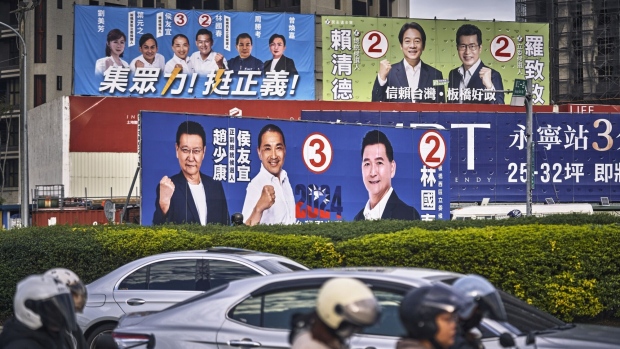Jan 11, 2024
One of These Three Men Will Be Taiwan’s Next President
, Bloomberg News

(Bloomberg) -- Taiwan’s presidential election Saturday will be the first big test of democracy in a year of pivotal elections globally, deciding the leader of the biggest geopolitical flashpoint between China and the US.
The winner of the tight, three-way contest must navigate delicate relationships with both superpowers while meeting demands from Taiwan’s 23.4 million people on domestic issues ranging from high home prices to slower-than-expected wage growth. Three men are vying to succeed Taiwan’s first female leader, Tsai Ing-wen, who is reviled by China for standing up for the island’s autonomy yet recognized globally for her deft handling of the pandemic.
Meet the three, radically different men vying to lead Taiwan:
Lai Ching-te, Democratic Progressive Party
The continuity candidate is Taiwan Vice President Lai Ching-te of the Democratic Progressive Party. Lai has pledged to continue Tsai’s cross-strait policies, including Taiwan’s right to self-determination in the face of China’s claim that the island is its territory. Like Tsai, he plans to maintain tight links to the US, which supplies most of the island’s weapons, and build more ties with democracies in Europe and elsewhere.
Lai, who trained as a doctor and served as mayor of the southern city of Tainan, once called himself as a “pragmatic worker for Taiwanese independence”, a phrase that angered Beijing and raised concerns in Washington about his ability to manage relations with China. The 64-year-old has since softened his stance, and is open to talks with China — on an equal footing.
War With China Is the Threat That Defines Taiwan’s Next Election
Taiwan Election Takes Shape as Vice President Aims for Top Job
Hou Yu-ih, Kuomintang
The candidate for the Kuomintang, the main opposition party, is Hou Yu-ih, mayor of New Taipei, the island’s most-populous city. The 66-year-old veteran cop built his reputation handling high profile crimes, including helping end a 1990s hostage crisis involving a diplomatic family.
The KMT, which ruled Taiwan as a one-party state for decades, wants engagement with China, arguing that cross-strait tensions can be eased through dialogue and mutually beneficial deals. Hou says that chilled relations or the absence of talks creates misunderstandings and risks the safety of Taiwan’s people. But the grassroots politician has been questioned about his ability to form key policies in areas like defense and national security. Many also distrust the KMT, seeing it as too close to Beijing.
Taiwan’s Former Top Cop Wants China Talks If Voted President
Taiwan Presidential Hopeful Vows to Maintain Peace With China
Ko Wen-je, Taiwan People’s Party
The wild card in Saturday’s election is Ko Wen-je of the upstart Taiwan People’s Party, which offers itself as an alternative to the establishment DPP and KMT. A former trauma surgeon and ex-mayor of the capital Taipei, Ko has won solid support among younger people, nimbly using social media to reach voters. His blunt approach has won him a reputation for tackling problems head on, but he’s also been criticized for rude and sexist language.
The 64-year-old has also pledged concrete steps to boost wages and address other cost-of-living issues. Ko says he can deliver better China ties, promoting himself as a “middle-ground” solution between his rival parties. Still, he has been criticized for seeming to waver on relations with Beijing and briefly flirted with a KMT alliance.
Socially Awkward Outsider Is Surprise Contender to Lead Taiwan
Taiwan Presidential Contender Talks Navigating China-US Tensions
©2024 Bloomberg L.P.


